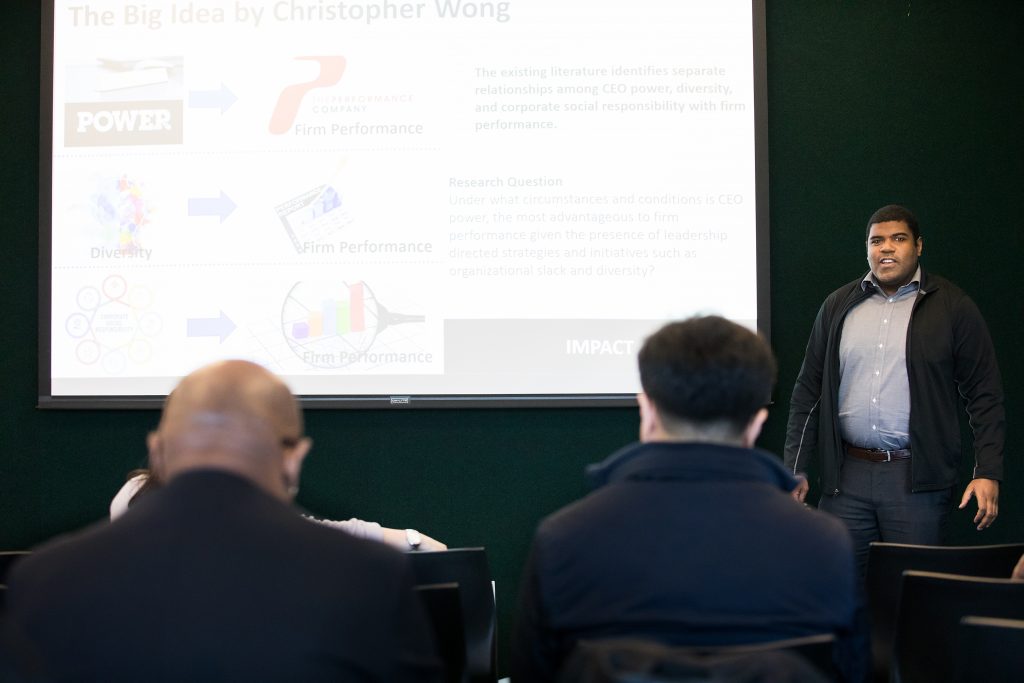What can you say in three minutes or less? That’s what doctoral students across the Fox School of Business and Temple University were challenged to do: take their years-long dissertation research on a complex academic topic and turn it into a 180-second speech.
Temple hosted its inaugural university-wide 3-Minute Thesis (3MT) competition in April. The competition, originally developed by the University of Queensland in Australia, seeks to help students communicate their research to a broader audience beyond their personal academic fields. As the name suggests, participants have three minutes and a single, static presentation slide to explain their research, from the theoretical concept to their results and findings.
The event was moderated by Christina Owings, assistant professor of practice at the Fox School. Before coming to the Fox School, Owings worked as a communications consultant for high-level executives. As a faculty member, she works with PhD students on communicating their work to a broader audience.
“I am passionate about how we communicate our information,” Owings says, “and the 3-Minute Thesis competition is a wonderful opportunity for us to understand our presenters’ research and for them to have a chance to communicate it with us, a broad and warmly receptive audience.”
Xinjie Ma and Najja Orr, doctoral students at the Fox School, were two of the 12 competitors, made up of students from across the university who had been selected as representatives by their respective schools and colleges. Ma, a PhD student concentrating in accounting, and Orr, an Executive Doctorate in Business Administration (DBA) student, won the Fox School’s selection contests for their programs.
Ma’s presentation examined how investors react when companies end their regular earnings conference calls on a high note. Psychological studies suggest that individuals prefer good endings, such as hearing good news after bad news rather than the other way around. Ma found that managers often end these calls on a high note to hide bad news. However, investors on average see through the managers’ optimistic conclusions and react negatively.
“Overall, I’m not suggesting that a last impression is not important,” says Ma. “But in the stock market setting, when we focus on the behavior of a group of professionals, leaving a good last impression isn’t an effective way to hide bad news.”
In his presentation, Orr disccussed the process of evaluating a program’s social impact. “Oftentimes, inadequate public funding can strain social service agencies’ ability to fulfill all their consumers’ needs,” says Orr. “And funders now expect to see a demonstrated benefit to the community and a return on investment.” His research looks into whether a theory-based program evaluation, using the theory of change to connect program activities and outcomes to long-term goals, would improve the program’s results.
University officials from across Temple, from the Division of Student Affairs to the Strategic Marketing and Communications Department, joined the judging panel. A debrief session was held afterward while judging took place, where participants discussed how they put together their presentations.
Michael Flynn from the College of Engineering was awarded first place, while Melissa Betters and Jay Fidel from the College of Science and Technology took second place and the People’s Choice awards, respectively. Each prize was accompanied by a scholarship and Flynn will represent Temple at an upcoming regional competition.
“Our Fox students performed very well,” says Sudipta Basu, associate dean of research at the Fox School. “While we didn’t win, we are proud to have brought the 3MT competition to the university by serving as a laboratory for experimentation.” Since Basu became associate dean in 2019, the Fox School has integrated the 3MT format into its doctoral programs and grant-funding competitions, helping students and junior faculty members enhance their presentation and translational research skills.
